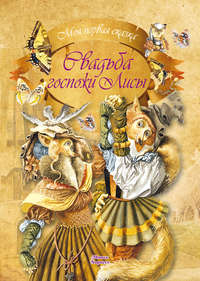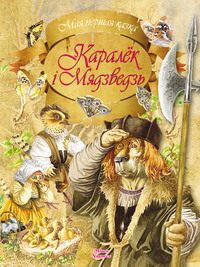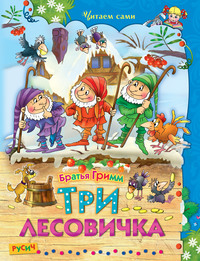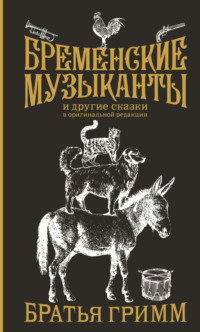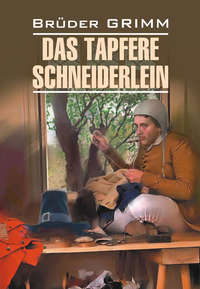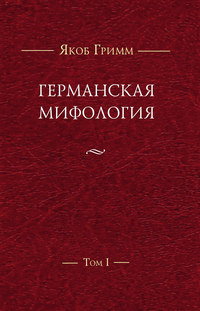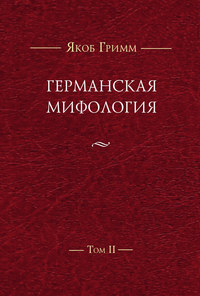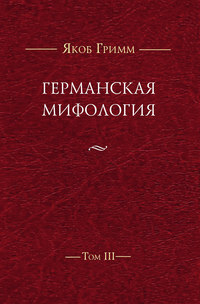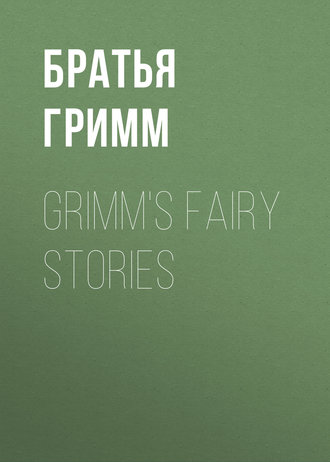 полная версия
полная версияGrimm's Fairy Stories
On the third night he sat down again on his bench, saying in great vexation, "Oh, if I could only shiver!" When it grew late, six tall men came in bearing a coffin between them. "Ah, ah," said he, "that is surely my little cousin, who died two days ago"; and beckoning with his finger he called, "Come, little cousin, come!" The men set down the coffin upon the ground, and he went up and took off the lid, and there lay a dead man within, and as he felt the face it was as cold as ice. "Stop a moment," he cried; "I will warm it in a trice"; and stepping up to the fire he warmed his hands, and then laid them upon the face, but it remained cold. So he took up the body, and sitting down by the fire, he laid it on his lap and rubbed the arms that the blood might circulate again. But all this was of no avail, and he thought to himself if two lie in a bed together they warm each other; so he put the body in the bed, and covering it up laid himself down by its side. After a little while the body became warm and began to move about. "See, my cousin," he exclaimed, "have I not warmed you?" But the body got up and exclaimed, "Now I will strangle you." "Is that your gratitude?" cried the youth. "Then you shall get into your coffin again"; and taking it up, he threw the body in, and made the lid fast. Then the six men came in again and bore it away. "Oh, deary me," said he, "I shall never be able to shiver if I stop here all my lifetime!" At these words in came a man who was taller than all the others, and looked more horrible; but he was very old and had a long white beard. "Oh, you wretch," he exclaimed, "now thou shalt learn what shivering means, for thou shalt die!"
"Not so quick," answered the youth; "if I die I must be brought to it first."
"I will quickly seize you," replied the ugly one.
"Softly, softly; be not too sure. I am as strong as you, and perhaps stronger."
"That we will see," said the ugly man. "If you are stronger than I, I will let you go; come, let us try"; and he led him away through a dark passage to a smith's forge. Then taking up an axe he cut through the anvil at one blow down to the ground. "I can do that still better," said the youth, and went to another anvil, while the old man followed him and watched him, with his long beard hanging down. Then the youth took up an axe, and, splitting the anvil at one blow, wedged the old man's beard in it. "Now I have you; now death comes upon you!" and taking up an iron bar he beat the old man until he groaned, and begged him to stop, and he would give him great riches. So the youth drew out the axe, and let him loose. Then the old man, leading him back into the castle, showed him three chests full of gold in a cellar. "One share of this," said he, "belongs to the poor, another to the King, and a third to yourself." And just then it struck twelve and the old man vanished, leaving the youth in the dark. "I must help myself out here," said he, and groping round he found his way back to his room and went to sleep by the fire.
The next morning the King came and inquired, "Now have you learnt to shiver?" "No," replied the youth; "what is it? My dead cousin came here, and a bearded man, who showed me a lot of gold down below; but what shivering means, no one has showed me!" Then the King said, "You have won the castle, and shall marry my daughter."
"That is all very fine," replied the youth, "but still I don't know what shivering means."
So the gold was fetched, and the wedding was celebrated, but the young Prince (for the youth was a Prince now), notwithstanding his love for his bride, and his great contentment, was still continually crying, "If I could but shiver! if I could but shiver!" At last it fell out in this wise: one of the chambermaids said to the Princess, "Let me bring in my aid to teach him what shivering is." So she went to the brook which flowed through the garden, and drew up a pail of water full of little fish; and, at night, when the young Prince was asleep, his bride drew away the covering and poured the pail of cold water and the little fishes over him, so that they slipped all about him. Then the Prince woke up directly, calling out, "Oh! that makes me shiver! dear wife, that makes me shiver! Yes, now I know what shivering means!"
DUMMLING AND THE THREE FEATHERS
Once upon a time there lived a King who had three sons; the two elder were learned and bright, but the youngest said very little and appeared somewhat foolish, so he was always known as Dummling.
When the King grew old and feeble, feeling that he was nearing his end, he wished to leave the crown to one of his three sons, but could not decide to which. He thereupon settled that they should travel, and that the one who could obtain the most splendid carpet should ascend the throne when he died.
So that there could be no disagreement as to the way each one should go, the King conducted them to the courtyard of the Palace, and there blew three feathers, by turn, into the air, telling his sons to follow the course that the three feathers took.
Then one of the feathers flew eastwards, another westwards, but the third went straight up towards the sky, though it only sped a short distance before falling to earth.
Therefore one son travelled towards the east, and the second went to the west, both making fun of poor Dummling, who was obliged to stay where his feather had fallen. Then Dummling, sitting down and feeling rather miserable after his brothers had gone, looked about him, and noticed that near to where his feather lay was a trap-door. On lifting this up he perceived a flight of steps, down which he went. At the bottom was another door, so he knocked upon it, and then heard a voice calling —
"Maiden, fairest, come to me,Make haste to ope the door,A mortal surely you will see,From the world above is he,We'll help him from our store."And then the door was flung open, and the young man found himself facing a big toad sitting in the centre of a number of young toads. The big toad addressed him, asking him what he wanted.
Dummling, though rather surprised when he saw the toads, and heard them question him, being good-hearted replied politely —
"I am desirous to obtain the most splendid carpet in the world; just now it would be extremely useful to me."
The toad who had just spoken, called to a young toad, saying —
"Maiden, fairest, come to me,'Tis a mortal here you see;Let us speed all his desires,Giving him what he requires."Immediately the young toad fetched a large box. This the old one opened, and took out an exquisite carpet, of so beautiful a design, that it certainly could have been manufactured nowhere upon the earth.
Taking it with grateful thanks, Dummling went up the flight of steps, and was once more in the Palace courtyard.
The two elder brothers, being of the opinion that the youngest was so foolish that he was of no account whatever in trying to obtain the throne, for they did not think he would find anything at all, had said to each other:
"It is not necessary for us to trouble much in looking for the carpet!" so they took from the shoulders of the first peasant they came across a coarse shawl, and this they carried to their father.
At the same time Dummling appeared with his beautiful carpet, which he presented to the King, who was very much surprised, and said —
"By rights the throne should be for my youngest son."
But when the two brothers heard this, they gave the old King no rest, saying —
"How is it possible that Dummling, who is not at all wise, could control the affairs of an important kingdom? Make some other condition, we beg of you!"
"Well," agreed the father, "the one who brings me the most magnificent ring shall succeed to my throne," and once more he took his sons outside the Palace. Then, again, he blew three feathers into the air to show the direction each one should go; whereupon the two elder sons went east and west, but Dummling's flew straight up, and fell close by the trap-door. Then the youngest son descended the steps as before, and upon seeing the large toad he talked with her, and told her what he desired. So the big box was brought, and out of it the toad handed him a ring which was of so exquisite a workmanship that no goldsmith's could equal it.
Meanwhile the two elder brothers made fun of the idea of Dummling searching for a ring, and they decided to take no needless trouble themselves.
Therefore, finding an old iron ring belonging to some harness, they took that to the King. Dummling was there before them with his valuable ring, and immediately upon his showing it, the father declared that in justice the kingdom should be his.
In spite of this, however, the two elder sons worried the poor King into appointing one test further, before bestowing his kingdom, and the King, giving way, announced that the one who brought home the most beautiful woman should inherit the crown.
Then Dummling again descended to the large toad and made known to her that he wished to find the most beautiful woman alive.
"The most beautiful woman is not always at hand," said the toad, "however, you shall have her."
Then she gave to him a scooped-out turnip to which half a dozen little mice were attached. The young man regarded this a trifle despondently, for it had no great resemblance to what he was seeking.
"What can I make of this?" he asked.
"Only place in it one of my young toads," replied the large toad, "and then you can decide how to use it."
From the young toads around the old toad, the young man seized one at hazard, and placed it in the scooped-out turnip, but hardly was it there when the most astounding change occurred, for the toad was transformed into a wondrously lovely maiden, the turnip became an elegant carriage, and the six mice were turned into handsome horses. The young man kissed the maiden and drove off to bring her to the King.
Not long afterwards the two brothers arrived.
In the same way, as the twice before, they had taken no trouble about the matter, but had picked up the first passable looking peasant woman whom they had happened to meet.
After glancing at the three, the King said: "Without doubt, at my death the kingdom will be Dummling's."
Once more the brothers loudly expressed their discontent, and gave the King no peace, declaring —
"It is impossible for us to agree to Dummling becoming ruler of the kingdom," and they insisted that the women should be required to spring through a hoop which was suspended from the ceiling in the centre of the hall, thinking to themselves "Now, certainly our peasants will get the best of it, they are active and sturdy, but that fragile lady will kill herself if she jumps."
To this, again, the King consented, and the peasants were first given trial.
They sprang through the hoop, indeed, but so clumsily that they fell, breaking their arms and legs.
Upon which the lovely lady whom Dummling had brought home, leapt through as lightly as a fawn, and this put an end to all contention.
So the crown came to Dummling, who lived long, and ruled his people temperately and justly.
LITTLE SNOW WHITE
It was in the middle of winter, when the broad flakes of snow were falling around, that a certain queen sat working at her window, the frame of which was made of fine black ebony; and, as she was looking out upon the snow, she pricked her finger, and three drops of blood fell upon it. Then she gazed thoughtfully down on the red drops which sprinkled the white snow and said, "Would that my little daughter may be as white as that snow, as red as the blood, and as black as the ebony window-frame!" And so the little girl grew up; her skin was a white as snow, her cheeks as rosy as blood, and her hair as black as ebony; and she was called Snow-White.
But this queen died; and the king soon married another wife, who was very beautiful, but so proud that she could not bear to think that any one could surpass her. She had a magical looking-glass, to which she used to go and gaze upon herself in it, and say —
"Tell me, glass, tell me true!Of all the ladies in the land,Who is fairest? tell me who?"And the glass answered, "Thou, Queen, art fairest in the land"
But Snow-White grew more and more beautiful; and when she was seven years old, she was as bright as the day, and fairer than the queen herself. Then the glass one day answered queen, when she went to consult it as usual —
"Thou, Queen, may'st fair and beauteous be,But Snow-White is lovelier far than thee?"When the queen heard this she turned pale with rage and envy; and calling to one of her servants said, "Take Snow-White away into the wide wood, that I may never see her more." Then the servant led the little girl away; but his heart melted when she begged him to spare her life, and he said, "I will not hurt thee, thou pretty child." So he left her there alone; and though he thought it most likely that the wild beasts would tear her to pieces, he felt as if a great weight were taken off his heart when he had made up his mind not to kill her, but leave her to her fate.
Then poor Snow-White wandered along through the wood in great fear; and the wild beasts roared around, but none did her any harm. In the evening she came to a little cottage, and went in there to rest, for her weary feet would carry her no further. Everything was spruce and neat in the cottage: on the table was spread a white cloth, and there were seven little plates with seven little loaves and seven little glasses with wine in them; and knives and forks laid in order, and by the wall stood seven little beds. Then, as she was exceedingly hungry, she picked a little piece off each loaf, and drank a very little wine out of each glass; and after that she thought she would lie down and rest. So she tried all the little beds; and one was too long, and another was too short, till, at last, the seventh suited her; and there she laid herself down and went to sleep. Presently in came the masters of the cottage, who were seven little dwarfs that lived among the mountains, and dug and searched about for gold. They lighted up their seven lamps, and saw directly that all was not right. The first said, "Who has been sitting on my stool?" The second, "Who has been eating off my plate?" The third, "Who has been picking at my bread?" The fourth, "Who has been meddling with my spoon?" The fifth, "Who has been handling my fork?" The sixth, "Who has been cutting with my knife?" The seventh, "Who has been drinking my wine?" Then the first looked around and said, "Who has been lying on my bed?" And the rest came running to him, and every one cried out that somebody had been upon his bed. But the seventh saw Snow-White, and called upon his brethren to come and look at her; and they cried out with wonder and astonishment, and brought their lamps and gazing upon her, they said, "Good heavens! what a lovely child she is!" And they were delighted to see her, and took care not to waken her; and the seventh dwarf slept an hour with each of the other dwarfs in turn, till the night was gone.
In the morning Snow-White told them all her story, and they pitied her, and said if she would keep all things in order, and cook and wash, and knit and spin for them, she might stay where she was, and they would take good care of her. Then they went out all day long to their work, seeking for gold and silver in the mountains; and Snow-White remained at home; and they warned her, saying, "The queen will soon find out where you are, so take care and let no one in." But the queen, now that she thought Snow-White was dead, believed that she was certainly the handsomest lady in the land; so she went to her glass and said —
"Tell me, glass, tell me true!Of all the ladies in the land,Who is fairest? tell me who?"And the glass answered —
"Thou, Queen, thou are fairest in all this land;But over the Hills, in the greenwood shade,Where the seven dwarfs their dwelling have made,There Snow-White is hiding; and sheIs lovelier far, O Queen, than thee."Then the queen was very much alarmed; for she knew that the glass always spoke the truth, and she was sure that the servant had betrayed her. And as she could not bear to think that any one lived who was more beautiful than she was, she disguised herself as an old pedlar woman and went her way over the hills to the place where the dwarfs dwelt. Then she knocked at the door and cried, "Fine wares to sell!" Snow-White looked out of the window, and said, "Good day, good woman; what have you to sell?" "Good wares, fine wares," replied she; "laces and bobbins of all colors." "I will let the old lady in; she seems to be a very good sort of a body," thought Snow-White; so she ran down, and unbolted the door. "Bless me!" said the woman, "how badly your stays are laced. Let me lace them up with one of my nice new laces." Snow-White did not dream of any mischief; so she stood up before the old woman who set to work so nimbly, and pulled the lace so tightly that Snow-White lost her breath, and fell down as if she were dead. "There's an end of all thy beauty," said the spiteful queen, and went away home.
In the evening the seven dwarfs returned; and I need not say how grieved they were to see their faithful Snow-White stretched upon the ground motionless, as if she were quite dead. However, they lifted her up, and when they found what was the matter, they cut the lace; and in a little time she began to breathe, and soon came to herself again. Then they said, "The old woman was the queen; take care another time, and let no one in when we are away."
When the queen got home, she went to her glass, and spoke to it, but to her surprise it replied in the same words as before.
Then the blood ran cold in her heart with spite and malice to hear that Snow-White still lived; and she dressed herself up again in a disguise, but very different from the one she wore before, and took with her a poisoned comb. When she reached the dwarfs' cottage, she knocked at the door, and cried, "Fine wares to sell!" but Snow-White said, "I dare not let any one in." Then the queen said, "Only look at my beautiful combs;" and gave her the poisoned one. And it looked so pretty that the little girl took it up and put it into her hair to try it; but the moment it touched her head the poison was so powerful that she fell down senseless. "There you may lie," said the queen, and went her way. But by good luck the dwarfs returned very early that evening; and when they saw Snow-White lying on the ground, they thought what had happened, and soon found the poisoned comb. And when they took it away, she recovered, and told them all that had passed; and they warned her once more not to open the door to any one.
Meantime the queen went home to her glass, and trembled with rage when she received exactly the same answer as before; and she said, "Snow-White shall die, if it costs me my life." So she went secretly into a chamber, and prepared a poisoned apple: the outside looked very rosy and tempting, but whosoever tasted it was sure to die. Then she dressed herself up as a peasant's wife, and travelled over the hills to the dwarfs' cottage, and knocked at the door; but Snow-White put her head out of the window, and said, "I dare not let any one in, for the dwarfs have told me not to." "Do as you please," said the old woman, "but at any rate take this pretty apple; I will make you a present of it." "No," said Snow-White, "I dare not take it." "You silly girl!" answered the other, "what are you afraid of? do you think it is poisoned? Come! do you eat one part, and I will eat the other." Now the apple was so prepared that one side was good, though the other side was poisoned. Then Snow-White was very much tempted to taste, for the apple looked exceedingly nice; and when she saw the old woman eat, she could refrain no longer. But she had scarcely put the piece into her mouth when she fell down dead upon the ground. "This time nothing will save thee," said the queen; and she went home to her glass, and at last it said – "Thou, Queen, art the fairest of all the fair." And then her envious heart was glad, and as happy as such a heart could be.
When evening came, and the dwarfs returned home, they found Snow-White lying on the ground; no breath passed her lips, and they were afraid that she was quite dead. They lifted her up, and combed her hair, and washed her face with wine and water; but all was in vain. So they laid her down upon a bier, and all seven watched and bewailed her three whole days; and then they proposed to bury her; but her cheeks were still rosy, and her face looked just as it did while she was alive; so they said, "We will never bury her in the cold ground." And they made a coffin of glass so that they might still look at her, and wrote her name upon it in golden letters, and that she was a king's daughter. Then the coffin was placed upon the hill, and one of the dwarfs always sat by it and watched. And the birds of the air came, too, and bemoaned Snow-White. First of all came an owl, and then a raven, but at last came a dove.
And thus Snow-White lay for a long, long time, and still only looked as though she were asleep; for she was even now as white as snow, and as red as blood, and as black as ebony. At last a prince came and called at the dwarfs' house; and he saw Snow-White and read what was written in golden letters. Then he offered the dwarfs money, and earnestly prayed them to let him take her away; but they said, "We will not part with her for all the gold in the world." At last, however, they had pity on him, and gave him the coffin; but the moment he lifted it up to carry it home with him, the piece of apple fell from between her lips, and Snow-White awoke, and exclaimed, "Where am I!" And the prince answered, "Thou art safe with me." Then he told her all that had happened, and said, "I love you better than all the world; come with me to my father's palace, and you shall be my wife." Snow-White consented, and went home with the prince; and everything was prepared with great pomp and splendor for their wedding.
To the feast was invited, among the rest, Snow-White's old enemy, the queen; and as she was dressing herself in fine, rich clothes, she looked in the glass and said, "Tell me, glass, tell me true! Of all the ladies in the land, Who is fairest? tell me who?" And the glass answered, "Thou, lady, art the loveliest here, I ween; But lovelier far is the new-made queen."
When she heard this, the queen started with rage; but her envy and curiosity were so great, that she could not help setting out to see the bride. And when she arrived, and saw that it was no other than Snow-White, whom she thought had been dead a long while, she choked with passion, and fell ill and died; but Snow-White and the prince lived and reigned happily over that land, many, many years.
CATHERINE AND FREDERICK
Once upon a time there was a youth named Frederick and a girl called Catherine, who had married and lived together as a young couple. One day Fred said, "I am now going into the fields, dear Catherine, and by the time I return let there be something hot upon the table, for I shall be hungry, and something to drink, too, for I shall be thirsty."
"Very well, dear Fred," said she, "go at once, and I will make all right for you."
As soon, then, as dinner-time approached, she took down a sausage out of the chimney, and putting it in a frying-pan with batter, set it over the fire. Soon the sausage began to frizzle and spit while Catherine stood by holding the handle of the pan and thinking; and among other things she thought that while the sausage was getting ready she might go into the cellar and draw some beer. So she took a can and went down into the cellar to draw the beer, and while it ran into the can, she bethought herself that perhaps the dog might steal the sausage out of the pan, and so up the cellar stairs she ran, but too late, for the rogue had already got the meat in his mouth and was sneaking off. Catherine, however, pursued the dog for a long way over the fields, but the beast was quicker than she, and would not let the sausage go, but bolted off at a great rate. "Off is off!" said Catherine, and turned round, and being very tired and hot, she went home slowly to cool herself. All this while the beer was running out of the cask, for Catherine had forgotten to turn the tap off, and so, as soon as the can was full, the liquor ran over the floor of the cellar until it was all out. Catherine saw the misfortune at the top of the steps. "My gracious!" she exclaimed; "what shall I do that Fred may not find this out?" She considered for some time till she remembered that a sack of fine malt yet remained from the last brewing, in one corner, which she would fetch down and strew about in the beer. "Yes," said she, "it was spared at the right time to be useful to me now in my necessity"; and down she pulled the sack so hastily that she overturned the can of beer for Fred, and away it mixed with the rest on the floor. "It is all right," said she, "where one is, the other should be," and she strewed the malt over the whole cellar. When it was done she was quite overjoyed at her work, and said, "How clean and neat it does look, to be sure!"


